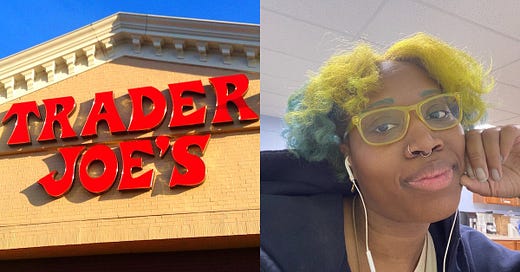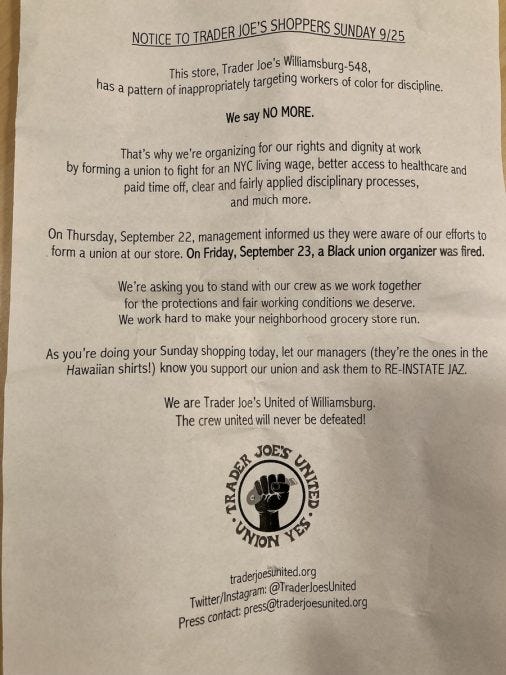"It was definitely retaliation"
Williamsburg Trader Joe's fired worker organizer Jaz W. tells her story
Workers at the Trader Joe’s store in Williamsburg, Brooklyn, announced yesterday that they are unionizing. If they win their upcoming election to affiliate with Trader Joe’s United, an independent, worker-led union, they will be the company’s third store in the United States to win official union recognition.
While the wave of youth-led workplace organizing continues to spread, so too has union busting. Last Friday, the day after management in Williamsburg announced it knew about the new unionization effort, Trader Joe’s fired Jaz W., a twenty-year-old black worker and native Brooklynite who has played a key role in the organizing efforts. Following workers’ informational picket in front of the store on Sunday to demand Jaz be reinstated and the launch of a GoFundMe to support workers like her, I sat down with her to discuss these events and the reasons why Trader Joe’s workers are unionizing.
EB: What’s it like working at Trader Joe’s? The company portrays itself as a good place to work and, anecdotally, the vibe of workers generally seems positive when you shop there.
JW: I’ve worked at Trader Joe’s for one year, and it’s a mixed bag. There are definitely some people who really like the job and who don’t feel like we should be complaining. But there are lots of others who say we deserve more, who think that things could be a lot better.
In comparison to Amazon, where workers have to pee in bottles, Trader Joe’s seems like a lovely job. But they’re giving us the bare minimum above literally the bare minimum. It’s calculated that a living wage in New York is $25 an hour, because everything is so expensive here. But we have people who’ve worked in the company for seven or ten years and they’re still making $17 or $18 hourly. It feels like a stab in the face.
In the past, I was hurting, and I have a lot of coworkers who have home instability. Yet we’d all be here at Trader Joe’s selling food to folks with smiles on our faces, even though some of us didn’t know where the next meal would be coming from.
Part of the reason the customers don’t see this side of things is because management goes out of its way to hire really friendly people. In that sense, I think they take advantage of our warm personalities. It’s true we love engaging with y’all, but on the backend of it, we deal with a lot. We’re the ones who create that culture in the store, but we don’t reap the benefits when it comes to making ends meet.
EB: Beyond pay, are there other issues that have spurred you all to unionize?
JW: There are lots of issues, like better health care, time-off policies, and fairer disciplinary processes. And we need a real say at work. Whenever I brought up my concerns, or raised concerns publicly in the morning huddles, the mates [assistant managers] would listen, but I’d only get evasive answers. The ones actually making the calls about how things are run aren’t ever the people who have to worry about whether their family is going to be able to eat the next day. They have job security, unlike the rest of us — we’re at-will employees who can be fired at any moment. It’s not sustainable.
They’re always telling us that Trader Joe’s doesn’t believe in hierarchy and bureaucracy. That’s why they have this lingo where general managers are called “captains,” assistant managers are called “mates,” and we’re called “crew members.” But even though the company uses this lingo, the same hierarchy — the same power structure — is still there.
At our store, there’s a particular mistreatment of workers of color. Lots of the people they’ve been recently letting go or punishing are people of color. And now I’m part of that list.
EB: Can you speak more about what that discrimination has looked like?
JW: We see who’s disciplined, who they tend to follow around the store, who gets put on their list to be watched. Lots of folks of color, we have to come from really faraway neighborhoods to work here, we live in places where the city doesn’t provide as reliable public transportation. Me, I live in East Flatbush. It can take me an hour and a half, or even two hours, to get to work in the early mornings — especially when the MTA cancels buses, which happens a lot in my neighborhood.
Management doesn’t really take that factor into consideration. At our store, there’s a six-minute grace period to arrive on time, which is really tight. Other places I’ve worked have had a ten- to fifteen-minute grace period. And even some other Trader Joe’s nearby have different rules. So they’re not consistent in their standards, and they tend to enforce discipline more on workers of color. That’s why one of our demands is for a fair and consistent disciplinary process.
EB: When did you start organizing for a union?
JW: There was a time earlier this year where we were extremely understaffed and overworked. Our manager even told us, “Hey, thank you guys for doing the work of four people.” Being so overworked really started the conversation among me and a few coworkers on the morning crew.
At first, we said “we should unionize” almost as a joke. But then after talking more, we said, “I guess we’re serious, I guess we’re really gonna do this.” Soon after that, we found out that there were folks on the night crew who had been having similar conversations and who had come to the same conclusion. So we merged our efforts.
EB: I heard that you all have been working with the Emergency Workplace Organizing Committee (EWOC), a national project that supports any worker looking to organize at work.
JW: Right. It was the folks on the evening shift who first reached out to EWOC, which has really been great in supporting us and helping us navigate this whole process. They’ve listened to us and made us feel heard in a way that we weren’t at our store — we’ve gotten so much organizing advice and encouragement, as well as information about our rights and about what to expect from management. Personally, they also helped me figure out how to navigate the workers’ comp issues that I’ve had to deal with due to my fibroid health problem and migraines.
EB: What organizing steps did you take at your store?
JW: There’s been a lot of moving in secret, because everyone here has a real fear of losing their jobs. So we started having one-on-one conversations with coworkers to gauge if they might be down. My approach was to ask folks how they felt about the job and then to go from there. And if we found someone who was like, “No, I’m wholeheartedly against unions,” we would just respect their decision and move on. We really focused on talking with those who were on the fence, and in working on getting supporters involved, rather than focusing on those who were a definite no.
Another thing that helped us was when [the Trader Joe’s store in] Hadley [Massachusetts] voted to unionize in July — that really fired up a bunch of people. We were so happy to see workers out there successfully standing up for themselves against corporate.
EB: You were fired last Friday, one day after management announced they knew about your union drive. Do you think this was an act of retaliation?
JW: It was definitely retaliation. They said it was for attendance issues, but I think it’s actually because they know I’m on the union’s organizing committee.
I’m a good worker. I work really well with the customers, and before all this, management explicitly told me they liked me. Until they found out we were unionizing, they were fine accommodating my health issues in terms of scheduling. But then all of a sudden, they fired me on Friday, right after announcing they knew about the union.
It’s sad on a personal level. After they fired me Friday morning, I went around the store to let my coworkers know I had just been fired. It was rough. Then I had to go collect my uniform and my grill from the break room — I really liked cooking breakfast for the staff.
EB: How are you and your coworkers holding up?
JW: I’ll be okay, and we’re demanding I get rehired. But this has intimidated other workers in the store. Some of them are still terrified about getting fired — they’re not well-versed in unions, they don’t know that we have rights, they don’t realize we have certain legal protections to organize.
But I’m hopeful that we’ll win the union at our store, that we can make it a much better place to work, and that our example will inspire others to fight for the same.
EB: Why do you think so many young workers are now looking to unionize?
JW: We were told that we’d be able to get the American dream if we worked hard and if we behaved. But it’s pretty obvious now that almost none of us actually can. So many people I know have thousands of dollars in student debt and are working multiple jobs a day just to get by.
All human beings deserve to get a living wage, to have medical care, to not have to worry about how they’re going to feed their families. But still we’re told every day by politicians and CEOs — most of whom have never had to worry about these things — that we should be happy with the scraps they’re giving us.
And it’s not just about money: we want work-life balance so we can pursue our dreams, so we can pursue our creativity. But we’re incapable of doing that because the systems of society prevent it. It’s dehumanizing. This new interest in unions shows that we’re trying to humanize society and our workplaces.







Thanks for your excellent labor reportage. This article gave me insight into the perspectives of Trader Joes workers. I frequently start conversations with workers there (I will not call them mates, captains or any of that bullshit) and find that they have no say over how their work is organized, not to mention that they have to work 2 jobs to be able to save anything.
I recently finished reading your book, Red State Revolt, the teachers' strikes and working class politics, and found it to be extremely useful for understanding teachers' grievances and tactics and strategies that are most effective in organizing teachers, especially in conservative regions of the country. As a former high school teacher, I found your detailed descriptions and analysis spot on.
Keep on doing the critical work that is necessary to uplift workers' by validating their concerns, work that is so necessary to revitalize the union movement in the US which for far too long has been dominated by business unionism and reliance on uncritical alliances with the Democratic Party.
Rick Girling, San Francisco